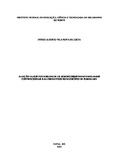Avaliação da sustentabilidade de agroecossistemas familiares convencionais e alternativos no município de Pureza-RN

Visualizar/
Data
2022-03-31Autor
Costa, Dyego Alberto Vila Nova da
http://lattes.cnpq.br/9565214298837247
Metadado
Mostrar registro completoResumo
The path to sustainability in agricultural production derives from a balanced and continuous relationship between nature and society, through effective methods of production, preservation and profitability. Thus, in this work, we seek to meet the needs of encouraging the development of family farmers in the municipality of Pureza (RN), either by adapting the existing production model or improving it. Therefore, a study was proposed with a view to understanding the current agricultural situation in the municipality of Pureza (RN), especially in relation to the population inserted in the countryside, since these people, for the most part, practice family farming. In addition, the importance of this study lies in the fact that this type of agriculture corresponds to one of the historical traits of several families, and is responsible for the regional supply of some products, thus having a relevant cultural and social function for peasant society. of the municipality. Thus, as it is a tool for designing indicators closer to the proposed objective, which is to assess the sustainability of agroecosystems, it has established itself as the most appropriate for comparing conventional monoculture, conventional polyculture and alternative polyculture. As a result of the study, a total of 29 indicators were identified in the three family agroecosystems surveyed, which are divided into social, economic and environmental dimensions, with the perspective of identifying the degree of sustainability, which after consolidated and compared field data, it is confirmed that the alternative polyculture model is more sustainable in the three dimensions than conventional polyculture and conventional monoculture. The results it was possible to conclude that all the characterization carried out, it is evident that the alternative polyculture agroecosystem is the most sustainable, in the three dimensions investigated; and that the migration from polyculture to monoculture, despite being a trend, does not show as the most advantageous option, reaching the point where the producer of conventional monoculture agroecosystem reconsiders the options to his management system the insertion of other cultures and /or fish farming. At the end of the work, a report will be sent as a management tool from the MESMIS steps, which will facilitate the identification and monitoring of agroecosystems, through the indicators produced. Such a tool will serve as a base parameter for improving sustainability, if social actors deem it necessary and convenient.



